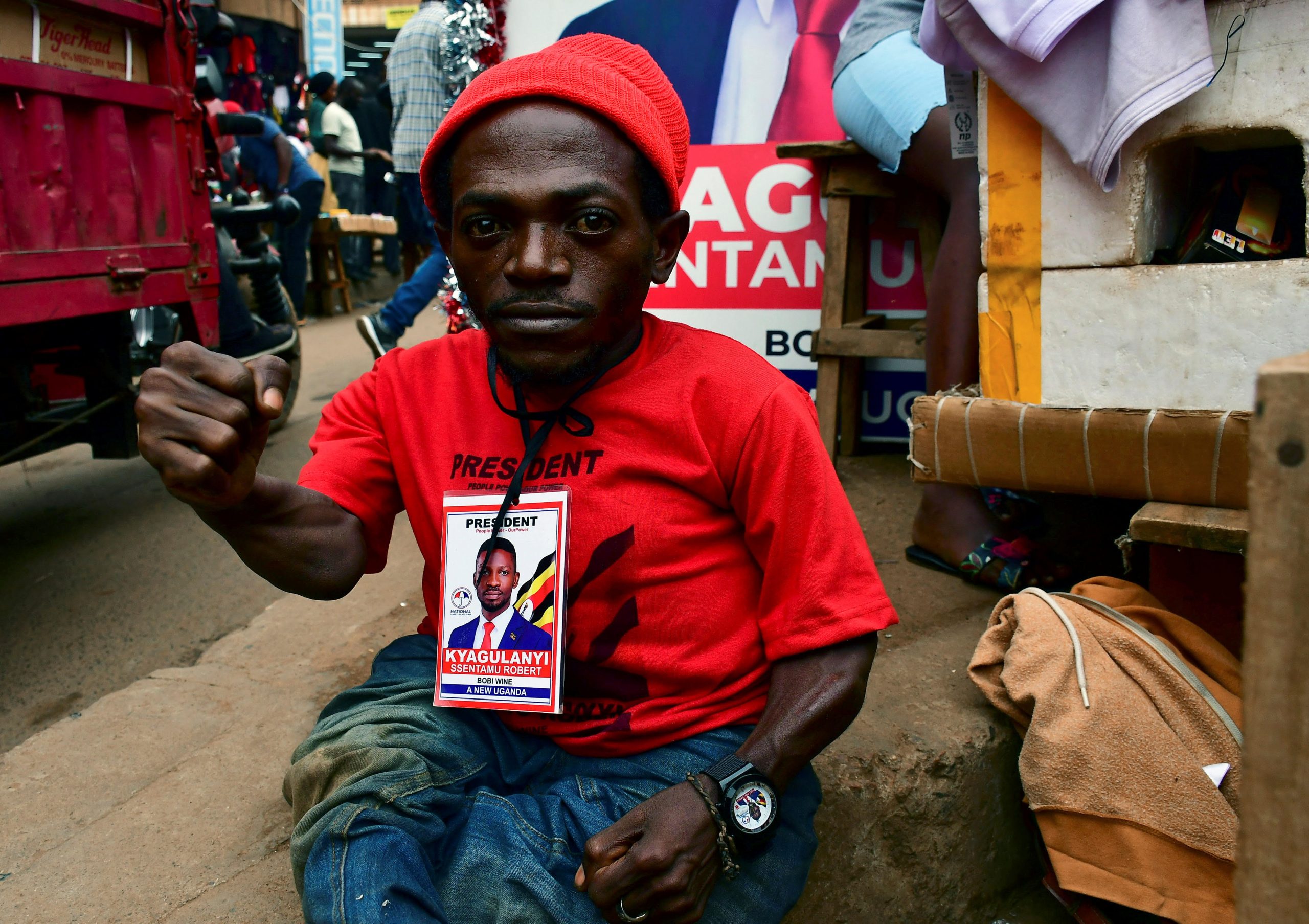One of Uganda’s most turbulent presidential election campaigns came to a close on Tuesday, 12 January 2021. As the curtains fell, President Yoweri Kaguta Museveni deployed a couple dozen military tanks on the last day of campaigns, coming complete with soldiers riding atop them as they roamed the streets of Kampala.
The message was unequivocal. The army was on standby.
Earlier that morning, President Museveni’s most formidable opponent, 38 year old pop star turned politician Robert Kyagulanyi Ssentamu alias Bobby Wine, had had to cut short a radio interview with a Kenyan media station when the Ugandan military descended on his Kampala residence, arresting his bodyguards and aides as the presidential candidate was articulating Ugandans’ upheavals under Museveni’s National Resistance Movement (NRM) government.
It wasn’t the first time Kyagulanyi was having run-ins with the police or the Uganda People’s Defense Force (UPDF). Forced to start wearing a bullet proof jacket mid-campaign, Kyagulanyi’s tribulations mirrored those of tens of opposition supporters, including his aides, most of whom encountered police violence, resulting in deaths in the worst case scenarios. On the eve of Election eve, the Ugandan state coerced the private security company guarding
Kyagulanyi’s Kampala address to immediately withdraw their services to the politician.
But even before the military descended on Kyagulanyi’s home on Tuesday morning, it had already curtailed the last minute campaigns of Patrick Oboi Amuriat, the man who took over the mantle of leading the Forum for Democratic Change (FDC) after Dr. Kizza Besigye stepped out of the arena. On Sunday evening, police arrested Amuriat for the alleged traffic offence of riding on atop his vehicle. Amuriat had beat a police barricade which was blocking him from reaching his campaign destination. Throughout the campaigns, Amuriat and Kyagulanyi, who is running on his National Unity Platform (NUP), have remained targets.
Beyond the arbitrary arrest, detention and charging of presidential candidates in the course of their campaigns, there have similarly been widespread reports of harassment, intimidation and the killing of aides and supporters. The same portion of police brutality was variously meted on civilians who were either attending political rallies or caught in the cat and mouse pursuits between overzealous police and opposition supporters. In fact, one of the most tragic
stains on this campaign period was what has since been dubbed the November 18 Kampala Massacre, where in the course of arresting Kyagulanyi, a number of civilians were shot dead in an almost day-long chaotic confrontation between the police and enraged civilians.
By Ugandan standards, this kind of heavy handedness isn’t new. Much as this shouldn’t be a race to the bottom as to which presidential election campaign has been most violent, the world has vivid memories of the trials and tribulations meted out on Dr. Kifefe Kizza Besigye over the years. Having contested for the presidency a record four times – 2001, 2006, 2011 and 2016 – this is the first election in two decades where Dr. Besigye isn’t a presidential candidate going against President Museveni, who has been in power for the last 36 years.
Much as Dr. Besigye’s party has an experienced contender in Mr. Amuriat, a longtime MP, it is the excitement created by Kyagulanyi’s mostly youthful coalition which has attracted much attention. This is mainly because for the longest time, broad consensus was that Museveni could only be dislodged from power by one of his erstwhile comrades from their time at the Luweero Triangle – the epicenter of the National Resistance Army’s five year war which brought Museveni to power. This thinking solidified as Dr. Besigye, who was Museveni’s physician and served in the first NRM cabinet, became the opposition’s default face.
Aside from Dr. Besigye, other former NRM cadres who have contested for the presidency against Museveni are Major General Mugisha Muntu, a one-time leader of the Ugandan People’s Defense Force (UPDF), who is a candidate in the polls slated for 14 January 2021, and Patrick Amama Mbabazi, Uganda’s former Prime Minister who unsuccessfully stood during the 2016 election. The other dissenting high profile Historical – as those who fought alongside Museveni are commonly referred to – was Gen. David ‘Tinyefuza’ Sejusa, who until his 2013 fallout with Museveni was a senior presidential advisor and coordinator of intelligence. Sejusa parted ways with Museveni after he made claims that there was a plot for
Museveni to hand over power to his son, Lieutenant General Muhoozi Kainerugaba, 46.
And so as President Museveni clamps down on opposition presidential candidates and their supporters and shuts down social media platforms on election eve, the one undeniable thing is that Kyagulanyi’s impressive run has shifted the ground in Ugandan politics. Kyagulanyi has proven that someone who did not participate in the bush war, like Dr. Besigye, Maj. Gen. Muntu and Gen. Sejusa, can stand up to the strongman and give him a run for his money.
On the last day of campaigns, President Museveni opted to hang around Kampala, a city where Kyagulanyi – who is the MP for Kyadondo East Constituency within the capital – and Dr. Besigye’s FDC – whose candidate for Mayor, Erias Lukwago, has held the seat for a decade – enjoy massive support. No matter how the presidential vote goes, with legitimate fears that it won’t be free and fair just as previous polls have been – President Museveni will no longer sit pretty imagining he has a tight grip of Uganda and that no one else but his bush-war comrades can dare challenge him. Kyagulanyi may just have belled the cat.

